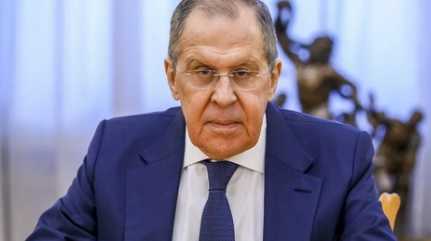
30 Mar 2023; MEMO: Russia is reportedly attempting to persuade Iraq to reopen its airspace to the Russian military, in an effort to gain easier and cheaper access to eastern Syria.
According to the London-based news outlet, Middle East Eye, an anonymous diplomat of an unnamed country and Iraqi officials had told it that, during a visit to Baghdad last month by Russian Foreign Minister Sergey Lavrov and a large delegation, Lavrov did not only discuss trade and bilateral relations with his Iraqi counterparts, but also proposed a Russian-Syrian air corridor passing through Iraqi airspace.
That corridor would serve the purpose of transporting Russian troops and equipment to bases in eastern Syria – one of the areas in the country where it attempts to maintain a military presence in in its ongoing support for the regime of Bashar Al-Assad – while also being cost-effective.
Iraqi airspace had previously been open for Moscow until former Iraqi Prime Minister, Mustafa Al-Kadhimi's government imposed restrictions on it "under the pretext that [Russian flights] were threatening the US military bases in Iraq and Syria", the anonymous diplomat said. Its alternative route through Turkiye was restricted when Ankara also closed its airspace to Russian civil and military aviation in April last year, following the launch of Russia's invasion of Ukraine.
Under the new government of Iraqi Prime Minister, Muhammad Shia Al-Sudani, who came into power in October last year, Moscow is reportedly determined to restart its supply route to its forces through Iraq's airspace. It was confirmed by two of Al-Sudani's advisers who told the outlet that Lavrov asked the new Prime Minister for permission to grant Russian military aircraft access to the airspace to facilitate the passage of "logistical support" to forces in Syria. The Iraqi government, however, is still reportedly discussing and considering its options.
READ: Democracy in Iraq appears to be taking its terminal breath
Despite the current lack of approval, there has apparently been some progress in recent months, with the diplomat saying that the "new government granted three [flight] permits to the Russians during the past few months, but the Russian side did not receive them until shortly before the end of their validity period, and they did not benefit from them". The delay is reported to have been the result of the late transferral of permissions by Iraqi Joint Military Operations Command to the Russians.
Since then, the diplomat stated, "the use of Iraqi airspace has become a necessity for the Russians after the recent developments. The use of other corridors will be longer, more expensive and requires the approval of other countries".
The diplomat also said that gaining access to Iraqi airspace and activating the Russia–Syria–Iran–Iraq (RSII) security coalition "are the two most important files that Lavrov discussed with Sudani", having been set up in 2015 for the purpose of sharing intelligence and coordinating military operations against Daesh. Since the defeat of that group in 2019, though, the RSII coalition had become largely irrelevant.
Another key issue discussed by Lavrov and his Iraqi counterpart, Fuad Hussein, was the payment of debts to Russian companies operating in Iraq – debts which the country has struggled to pay after Western nations imposed sanctions on Moscow following its invasion of Ukraine.
The debt owed by Iraq to Russia amounts to around $1 billion, according to the diplomat, and consist of debts in the oil and defence industries. While much of the oil debt can be repaid in the form of providing a share of oil, the "problem is in the debts of the Ministry of Defence, and this may be used by Russia as a pressure card" for access to Iraqi airspace.
The diplomat admitted, however, that the overall debt figure "does not mean anything to Russia and is not a priority for Moscow" as it is not considered too large. "But it remains a debt that must be paid."




